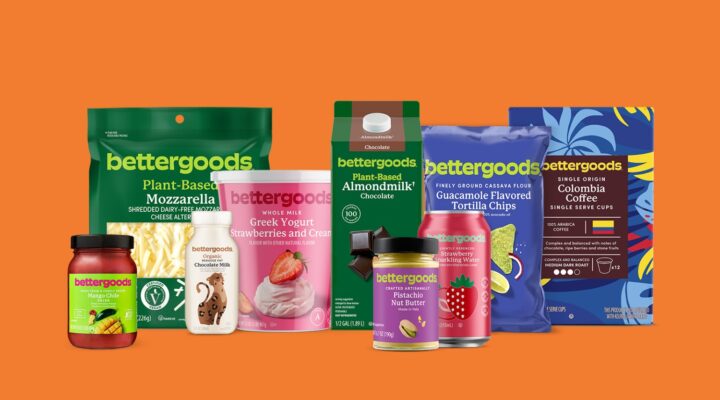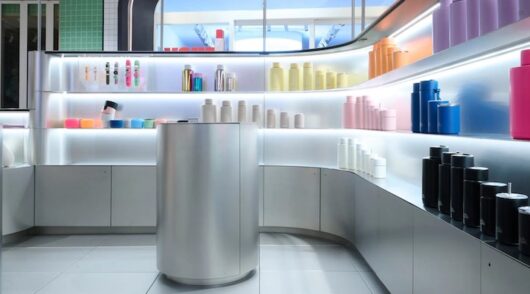This week big-box retailer Walmart announced the launch of a new private-label grocery brand called Bettergoods. The release marks Walmart’s largest private brand food launch in 20 years and the fastest private food brand the retailer has brought to market. The Bettergoods line features 300 items including frozen, dairy, snacks, beverages, pasta, soups, coffee and chocolate, with prices ranging from under $2 to $15, with the majority of the products available for under $5. Accordin
According to the retailer, Bettergoods items fall within three distinct category pillars, including:
Culinary experiences: Items spotlighting innovative recipes, elevated ingredients and food-trend forward offerings, including specialty salts and seasonings.
Plant-based: Products that feature distinct green branding and big flavors that are made to be devoured.
Made without: Options that cater to different dietary lifestyles, like gluten-free, or made without artificial flavors, colorings or added sugars.
Walmart’s senior vice president of private brands, food and consumables Scott Morris said the launch was driven by rising customer expectations.
“Today’s customers expect more from the private brands they purchase – they want affordable, quality products to elevate their overall food experience. The launch of Bettergoods delivers on that customer need in a meaningful way,” he said in a press release.
“Bettergoods is more than just a new private brand. It’s a commitment to our customers that they can enjoy unique culinary flavors at the incredible value Walmart delivers.”
The expansion of the private label market
Coresight retail analyst Sujeet Naik told Inside Retail that edible grocery private label offerings have been outperforming name brands in sales, despite the easing of food-at-home inflation in recent months.
As of March 24, sales of edible private-label products have grown 2.3 percent year-over-year (YoY), compared to the 1.1 per cent YoY growth seen by name brands. Additionally, private label products have seen a 3.1 per cent spike in unit sales growth over the same period, while unit sales for name-brand products have declined YoY.
A study by the Private Label Manufacturers Association confirmed that private label sales account for almost 21 per cent of grocery industry unit sales in 2023, reaching an all-time high.
Naik noted that consumer product goods companies’ multiple rounds of price hikes over the past years have created an opening for private-label sales that previously did not exist.
“This offers a strong opportunity for retailers to pivot and launch or expand private-label assortments in suitable categories, particularly those that have traditionally been challenging to enter due to the strong brand presence of national brands,” he said.
While private label brands have historically been associated with generic items or copycat branding, Naik said they are now drawing serious attention from retailers.
“The unique circumstance of high grocery inflation helped private label gain more visibility, but it is the consistent advances in quality, packaging and product concepts that have been
driving consumer interest over the years,” he said.
“Retailers have the competitive advantage of leveraging existing brand recognition, shopper loyalty and supply chain strength to promote new private-label offerings to shoppers.”
The retail analyst suggested that retailers should use existing brand recognition, shopper loyalty and supply chain strength to promote new private-label offerings to shoppers and warned that branded companies who choose to ignore the private-label challenge could find themselves at odds with their own customers.
Big-box retailers dipping into the private-label brands market
In 2022, the leading retailers in private label brand sales were Aldi (77.5 per cent), Trader Joe’s (59.4 per cent), Wegmans (49 .5 per cent), Costco (33.5 per cent), Sam’s Club (30 per cent), H-E-B (26.9 per cent), and Walmart (23.3 per cent), according to a report by global data and business intelligence platform Statista.
With the launch of Bettergoods, Walmart is likely to increase its market share in this space in 2024.
Walmart isn’t the only large-scale food retailer to dive deeper into the growing private label pool in 2024.
In February, Target launched Dealworthy, which includes 400 everyday staple items ranging from paper towels to cotton balls. Prices range from less than $1 to under $10.
Areas of growth opportunity
According to a Food Marketing Institute survey conducted from March-April 2023, around 90 per cent of food industry executives expressed that private label brands are extremely or very important to their organizations.
Additionally, around 82 per cent of these executives stated they plan to moderately or significantly raise private-label investment over the next two years.
Naik noted that CPG companies most exposed to staple foods such as milk, cheese and pasta are the most likely to see consumers trading down to private label brands if they offer competitive pricing and are perceived to be of similar quality.
However, he pointed out that there is low or no private-label penetration in many alcoholic and non-alcoholic beverage categories, as consumers focus more on the taste and quality of these products rather than price point.
Further reading: Aldi to open 800 more US stores by 2028







